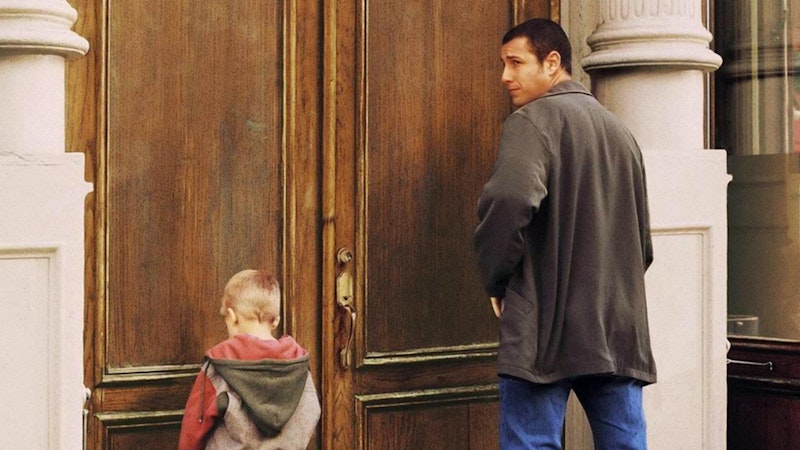One aspect of popular American cinema in the 1990s that was lost on me at the time was how self-aware and self-referential it had become. Since Pulp Fiction and Quentin Tarantino’s torrent of interviews and media appearances began early in the decade, American movies quickly conformed to his way of seeing the world—through cinema. Movies became more self-reflexive than ever as soon as I started to see them regularly. It took me until 24 to watch Five Easy Pieces, not for any particular reason, everyone has gaps; but even now, I can’t watch its famous diner scene without thinking of Big Daddy and the fiasco of ordering McDonald’s breakfast after 10:30 a.m.
Big Daddy came in the middle of a cycle of comedies starring Adam Sandler that endeared him to at least two, maybe three generations of kids, and he remains beloved, despite openly wasting Netflix’s money on terrible movies so he can go on vacation with his famous friends. Really, he only has to turn in a “real dramatic performance” once every two decades to keep people in check: keep in mind that Punch-Drunk Love came out just three months before the superior Sandler-animated Christmas comedy Eight Crazy Nights, which I saw twice at the United Artists Battery Park 16. He’s golden for a good stretch now after Uncut Gems, a performance he should’ve been nominated for and won at the Oscars. Maybe too many people resent him for being so versatile and successful—not exactly a stretch, right?
After Happy Gilmore, Billy Madison, The Waterboy, and The Wedding Singer, Sandler starred in Big Daddy, directed by Dennis Dugan and co-starring twins Dylan and Cole Sprouse as the kid that Sandler’s layabout bachelor has to take care of. The Sprouse twins are two of the most successful contemporary child actors, who’ve managed to reach their 30s without losing work or being typecast—getting ready to write this article, I thought that Jonathan Lipnicki played the kid. At six, a few things struck me about Big Daddy: I identified more with Sandler than the kid, but unlike so many other movies featuring child actors, Big Daddy doesn’t patronize or put condescending baby babble into the mouths of kids who know better. In the American cinema, the young affluent white boy can only be offended by so much, if anything; but I always hated the way Hollywood treated kids on screen. Just as much as some of their “sexy high schoolers” were balding or bursting out of their bras, their pre-adolescent and even teenage characters were always SO GODDAMN DUMB!
Not the Sprouses in Big Daddy, whose character is subjected to the typical Hell of an American divorce, with neither guardian nor the state in his interest at all. It’s only Sandler’s “big daddy” that actually allows him to have a holistic upbringing, however volatile it is at times. He encourages the kid to pee in public (as seen on the poster). He should probably encourage better eating habits and more discipline in general. But this man demands that his kid get his McDonald’s breakfast. He needs it.
The McDonald’s breakfast scene, in retrospect, is obviously a reference to Five Easy Pieces, but it surpasses the original and gives it a true update for the 1990s. Corporate customer service is the butt of thousands of Hollywood jokes, setups, and set pieces in movies around this time, with Office Space, The Matrix, and Fight Club all released in the same year. Jack Nicholson took the piss out of waiters in general, but in Big Daddy, Sandler’s roar over the injustice of an arbitrary breakfast cutoff—which he just missed—still resonates, especially since the employees in Big Daddy are less assured than that stiff in Five Easy Pieces. She could’ve given him toast, and they could’ve given Sandler and his kid some hash browns, but they didn’t. In Nicholson’s case, it’s an example of impotent rage by a pathetic rich kid slumming it as an oil worker; for Sandler, his rage isn’t for himself but for the young boy he’s looking after, and it’s in this scene when he, the kid, and the audience realize how much he really cares about the kid and wants him to be happy.
They don’t get their McDonald’s breakfast, and no parenting book would ever suggest doing something like this to endear you to a young kid. But, as a six-year-old boy just two months younger than the Sprouse twins themselves, I knew that was exactly what you should do to get a kid to like and trust you. Everything turns out happy in the end for Sandler and the kid, with some kind of mixed custody situation that will ensure he grows up loved, cared for, and appropriately eccentric. Other than the numerous New York Press boxes in the movie, that’s what I loved most about Big Daddy: Sandler’s non-corny way of expressing love and affection for a kid who he doesn’t know but would protect with furious anger and force. That was cool—and I saw it twice, once with my mom and my brother, and again with my dad, at the Clearview Cinemas Chelsea on just another New York Saturday Sunday Movie Matinee.
—Follow Nicky Smith on Twitter: @nickyotissmith

